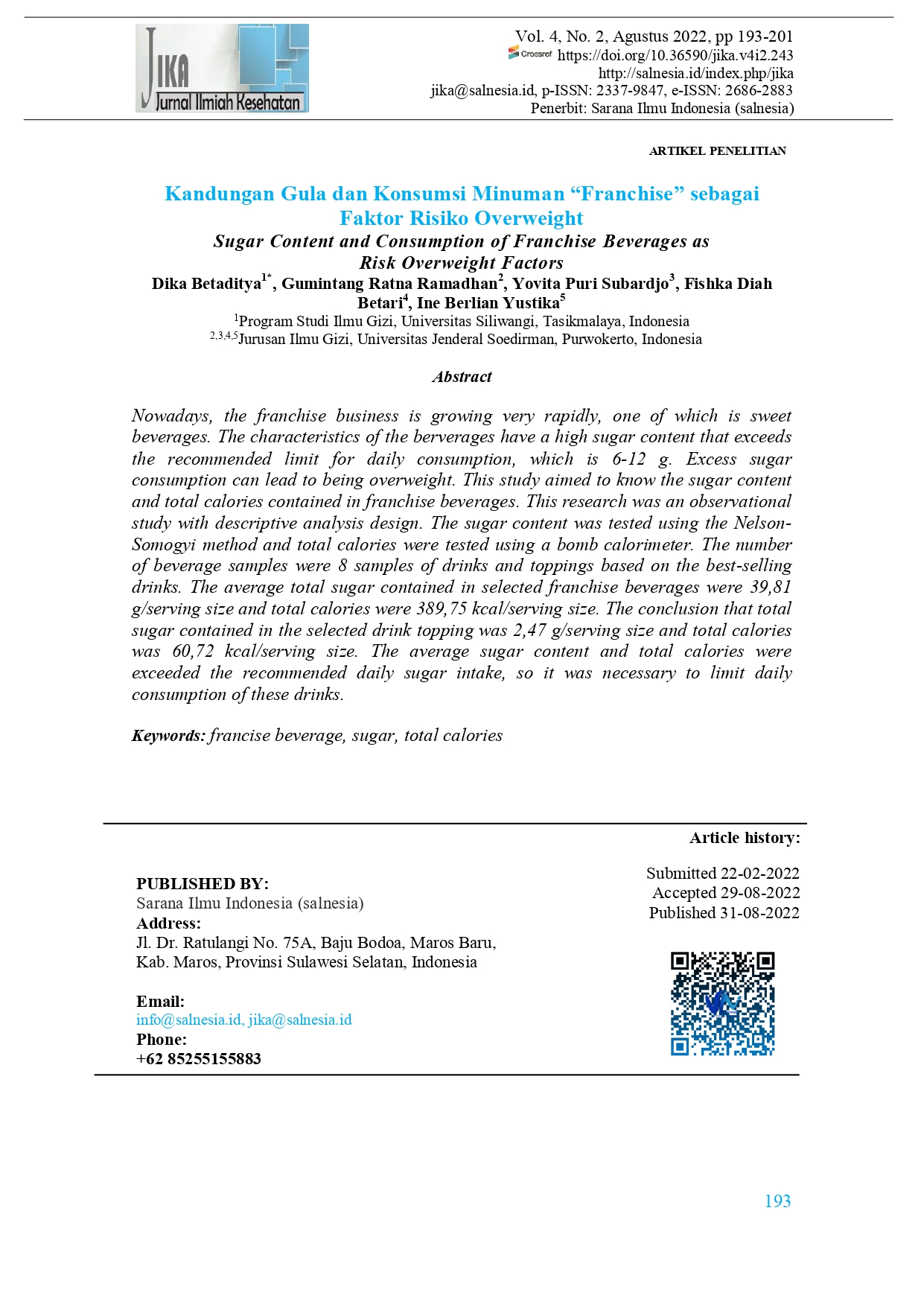Sugar Content and Consumption of Franchise Beverages as Risk Overweight Factors
DOI:
https://doi.org/10.36590/jika.v4i2.243Keywords:
francise beverage, sugar, total caloriesAbstract
Nowadays, the franchise business is growing very rapidly, one of which is sweet beverages. The characteristics of the berverages have a high sugar content that exceeds the recommended limit for daily consumption, which is 6-12 g. Excess sugar consumption can lead to being overweight. This study aimed to know the sugar content and total calories contained in franchise beverages. This research was an observational study with descriptive analysis design. The sugar content was tested using the Nelson-Somogyi method and total calories were tested using a bomb calorimeter. The number of beverage samples were 8 samples of drinks and toppings based on the best-selling drinks. The average total sugar contained in selected franchise beverages were 39,81 g/serving size and total calories were 389,75 kcal/serving size. The conclusion that total sugar contained in the selected drink topping was 2,47 g/serving size and total calories was 60,72 kcal/serving size. The average sugar content and total calories were exceeded the recommended daily sugar intake, so it was necessary to limit daily consumption of these drinks.
Downloads
References
Committee DGA. 2015. Scientific report of the 2015 Dietary Guidelines Advisory Committee: advisory report to the Secretary of Health and Human Services and the Secretary of Agriculture. Agricultural Research Service. Washington, DC, USA:, 2009–2019.
Febriyani NMPS, Briawan D. 2012. Minuman berkalori dan kontribusinya terhadap total asupan energi remaja dan dewasa. Jurnal Gizi dan Pangan, 7(1): 36–43.
Haque M, McKimm J, Sartelli M, Samad N, Haque SZ, Bakar MA. 2020. A narrative review of the effects of sugar-sweetened beverages on human health: A key global health issue. Journal of Population Therapeutics and Clinical Pharmacology, 27(1): e76–e103.
Harrington S. 2008. The role of sugar-sweetened beverage consumption in adolescent obesity: a review of the literature. The Journal of School Nursing. Sage Publications Sage CA: Los Angeles, CA, 24(1): 3–12.
Hnuchek K, Ismail I, Haron H. 2013. Franchisors’ Relationship Marketing and Perceived Franchisor Support on Franchisors’ Performance: A Case of Franchise Food and Beverage in Thailand. Journal of Economics, Business and Management, 1(1): 117–122. https://doi.org/10.7763/joebm.2013.v1.27.
Istikhomah MI dan Ro. 2018. Surakarta. Jurnal Ekonomi Manajemen Sumber Daya, Vol. 21, N: 98–110. https://doi.org/10.1093/gao/9781884446054.article.t082385.
Kemenkes [Kementerian Kesehatan] RI. 2013. Permenkes no.30 tahun 2013 tentang pencantuman informasi kandungan gula,garam dan lemak pada pangan siap saji. Kementrian Kesehatan Republik Indonesia.
Kemenkes [Kementerian Kesehatan RI. 2014. Peraturan Menteri Kesehatan RI No.41 Tahun 2014. Permenkes Nomor 41 Tahun 2014, 2014(August): 1–43.
Kemenkes [Kementerian Kesehatan] RI. 2018. Riset Kesehatan Dasar 2018. Jakarta: Kemenkes RI.
Lakoro Y, Hadi H, Julia M. 2016. Pola konsumsi air, susu dan produk susu, serta minuman manis sebagai faktor risiko obesitas pada anak sekolah dasar di Kota Yogyakarta dan Kabupaten Bantul. Jurnal Gizi dan Dietetik Indonesia (Indonesian Journal of Nutrition and Dietetics), 1(2): 102. https://doi.org/10.21927/ijnd.2013.1(2).102-109.
Luger M, Lafontan M, Bes-Rastrollo M, Winzer E, Yumuk V, Farpour-Lambert N. 2018. Sugar-Sweetened Beverages and Weight Gain in Children and Adults: A Systematic Review from 2013 to 2015 and a Comparison with Previous Studies. Obesity Facts, 10(6): 674–693. https://doi.org/10.1159/000484566.
Masri E. 2018. Faktor Determinan Perilaku Konsumsi Minuman Berkalori Tinggi pada Mahasiswa. Jurnal Farmasi dan Kesehatan, 8(2): 53–63.
Min JE, Green DB, Kim L. 2017. Calories and sugars in boba milk tea: implications for obesity risk in Asian Pacific Islanders. Food Science and Nutrition, 5(1): 38–45. https://doi.org/10.1002/fsn3.362.
O’Connor L, Imamura F, Lentjes MAH, Khaw K-T, Wareham NJ, Forouhi NG. 2015. Prospective associations and population impact of sweet beverage intake and type 2 diabetes, and effects of substitutions with alternative beverages. Diabetologia. Springer, 58(7): 1474–1483.
Qoirinasari Q, Simanjuntak BY, Kusdalinah K. 2018. Berkontribusikah konsumsi minuman manis terhadap berat badan berlebih pada remaja? AcTion: Aceh Nutrition Journal, 3(2): 88. https://doi.org/10.30867/action.v3i2.86.
Singh GM, Micha R, Khatibzadeh S, Lim S, Ezzati M, Mozaffarian D. 2015. Estimated global, regional, and national disease burdens related to sugar-sweetened beverage consumption in 2010. Circulation. Am Heart Assoc, 132(8): 639–666.
Siswanto. 2014. Buku Studi Diet Total: Survei Konsumsi Makanan Individu Indonesia 2014. Kementerian Kesehatan RI.
Stern JS, Kazaks A. 2009. Obesity: A reference handbook. ABC-CLIO.
Subardjo YP, Sudargo T, Julia M. 2013. Paparan iklan televisi terhadap pemilihan makanan dan asupan energi pada anak. Jurnal Gizi Klinik Indonesia, 10(2): 101. https://doi.org/10.22146/ijcn.18852.
US Department of Health and Human Services and US Department of Agriculture. 2015. Dietary guidelines for Americans. .
Veronica MT, Ilmi IMB. 2020. Minuman Kekinian di Kalangan Mahasiswa Depok dan Jakarta. Indonesian Jurnal of Health Development, 2(2): 83–91.
WHO. 2015. Guideline: sugars intake for adults and children. World Health Organization.

Downloads
Published
How to Cite
Issue
Section
License
Copyright (c) 2022 Dika Betaditya, Gumintang Ratna Ramadhan, Yovita Puri Subardjo, Fishka Diah Betari, Ine Berlian Yustika

This work is licensed under a Creative Commons Attribution 4.0 International License.








